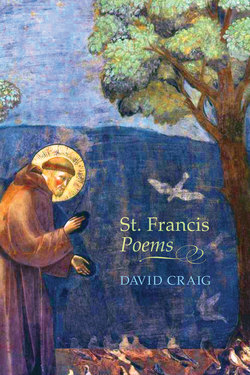Читать книгу St. Francis Poems - David Craig - Страница 5
На сайте Литреса книга снята с продажи.
I
ОглавлениеHis birth, vanity, frivolity and prodigality, how he became generous and charitable to the poor.
Dignity underfoot, he sang so loudly from stumps,
imaginary instruments, that anyone who passed
just had to watch him dare himself, paint his way
into one spiritual corner after another,
until he had no options but severest truth,
in the boisterous rhymes of the troubadours—
set right, by a grin so local it owns the world.
His father had named him after a country
where they knew their fabric, where they valued
life’s buckled and measured step
as well as its print, had insisted on a carafe of friends,
ridiculous neighbors—though Pica
wanted the breath of God: Giovanni!
So Francis learned to trade the prayer
the best cloth was for the smiles of new friends.
After work, his mates rang in the chorus
his money made: a cascade of mirth, grace,
surrounded as they all were,
by the cold stones of the only night.
It was all he could give them.
(Was he vain—or just so caught up in his enthusiasms
that they’d begun to make their own demands?)
He’d sew rags to more expensive stuffs,
embracing, again that widow want,
knowing he could not, needing to tell everyone
that as well. So he became a jongleur,
a determined clown, standing in the breech
between the sorrowful truth of this world
and the fleeting faces of his friends.
Courteous in manner, speech, even beyond
his exaggerated self-conscious parody;
everyone knew he could name his own future.
He loved to pose, but only because it promised
what was, in some real way, already here—
until a customer’s smirk razed him, brought him down
to squalor, to a world beyond his making,
to people who had nothing to give but their fleas.
It was that wound again,
what he and his friends felt: an abyss
that could not be filled.
Given this, he wondered, where could he live?
